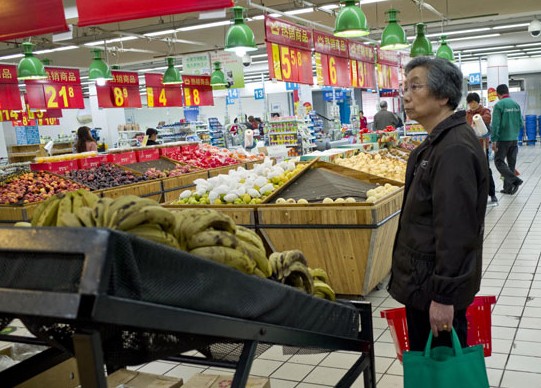| « Tencent seeks innovation with Qianhai bank | E-membership shows strong potential in O2O business » |
Wal-Mart to shut down outlet in Hangzhou

A customer shops at Wal-Mart's Zhaohui store in Hangzhou on Tuesday. Wal-Mart, the world's largest retailer by revenue, decided to shut down more than 20 outlets in China this year.
Closing part of company's plan to jettison underperforming stores
Wal-Mart Stores Inc, the world's largest retailer by revenue, plans to shut down another underperforming store?in Hangzhou, Zhejiang province?in late April, while a compensation dispute with employees from an inland store that closed in March remains unsolved.
Hu Yinghua, a saleswoman at Wal-Mart's Zhaohui store in Hangzhou, said they had a meeting on Wednesday afternoon as a formal notice of the closing of the store by the end of this month.
"The informal notification came on Tuesday night via text message. We have to choose before April 23 whether to be sent to other Wal-Mart stores in the city, or leave the company with a certain amount of compensation," she said.
Hu said upper-level managers explained during the meeting that the closure was strategically necessary.
There were a few customers at the store on Wednesday, but some shelves were already empty.
Shirley Zhang, media director from Wal-Mart China's Department of Corporate Affairs, confirmed that the store will close on April 23 as a part of the company's plan of shutting down those failing to make a profit.
The multinational company has opened about 400 stores on the Chinese mainland since it entered the market in the mid-1990s. The company decided to shut down more than 20 outlets in China this year because those stores comprise about 9 percent of the total, but have contributed only 2 to 3 percent of the total sales volume from 2013 to date, she said.
"We take these moves to achieve quality of growth, and we think the strategy adjustment will help us to better meet the demands of customers," she said.
Zhang said the company has tried to make proper arrangements for the employees affected by the closures, including allowing them to transfer to any outlet in China and subsidizing their relocation expenses, including transportation and accommodations.
However, the company's retreat from Changde was not seen as reasonable or fair by most of its local employees. More than 70 out of 135 employees from the store have asked their trade union to seek better compensation from the company after Wal-Mart told the workers on March 5 that the store would be closed in two weeks.
Huang Xingguo, chairman of the Changde store's trade union, said Wal-Mart did not provide an official notification to the trade union in advance for such a vital decision as the law stipulates and failed to show due respect to its employees.
"The day they announced the closure, employees from other cities arrived at the supermarket to replace our workers. It was humiliating and discriminatory," said Huang, whom employees elected as the trade union chairman in 2013.
He said the union has asked city authorities for formal arbitration to seek workers' rights in terms of collective negotiation, higher compensation for the mass layoffs, and pay for time not worked during the dispute.
"We ask Wal-Mart to double the existing compensation, but that is negotiable if the company is willing to resume dialogue," he said. "However, the company is busy removing its assets and has refused dialogue since late March."
Huang said Wal-Mart's tough stance was backed by inappropriate intervention from the local government.
He said the district's labor department provided written material to recognize that Wal-Mart closed its store in Changde legally, and police arrested several workers who took part in peaceful protests on March 21.
A labor inspection official surnamed Tan from Changde's Wuling district, who has been working as a mediator in the case, said the situation is "complicated" and urged workers to resort to legal channels to defend their rights.
Zhang, the media director from Wal-Mart China, defended the company's moves.
"Personally, I feel sympathetic toward these workers and understand their requirement for higher compensation, but our company has to handle that in accordance with the law," she said.
But Chang Kai, head of the School of Labor and Human Resources at Renmin University of China who participated in the legislation work for the Labor Contract Law from 2006 to 2008, believes Wal-Mart lacks legal justification for its behavior.
"The Changde outlet is just a branch of Wal-Mart, so it can't terminate employees' contracts under the name of disbanding the enterprise," he said. Under Chinese law, the company needs to provide an official resolution from a shareholders meeting to legitimize its decision to end its contracts with employees.
"What Wal-Mart did is actually a mass layoff, which requires the employer to inform workers one month in advance and listen to the trade union's suggestion for staff reallocation, which Wal-Mart has failed to do," he said.
Chang also said the trade union of Changde's Wal-Mart seeking better treatment for workers is significant, as it will set an example for similar cases in the future.